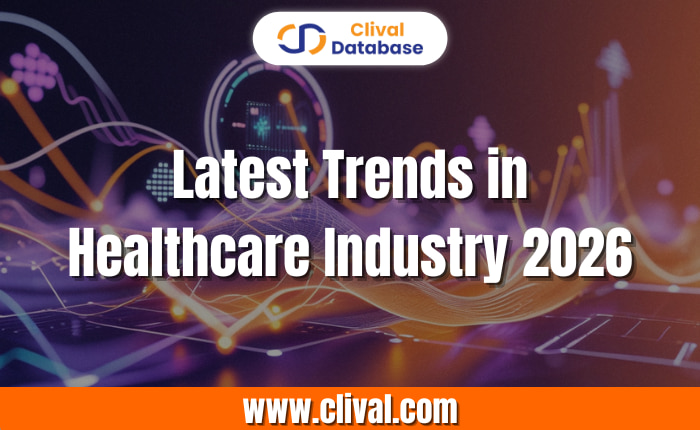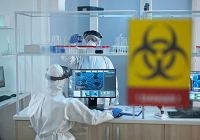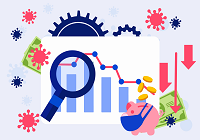The Future of Healthcare: 8 Tech Trends Everyone Should Watch in 2026
2026 is going to bring major tech revolutions in the healthcare sector. The new age technologies being developed lately are going to turn everything smarter, faster and more connected than what we were experiencing earlier.
Artificial intelligence is helping doctors to make quick decisions, with quantum computing, virtual hospitals and a lot more is coming up. All of this will lead to better diagnosis, swift drug discovery, and healthcare will be accessible to more and more people. Bottom line is, 2026 will is going to be one of the most important years for healthcare sector. So let’s dive in, and get a better look at what next year have up it’s sleeves.
Generative AI Revolutionizing Drug Discovery
Generative AI is transforming drug discovery by cutting down years of work into months — sometimes even weeks. Earlier, molecule screening was done manually, and doing this for thousands of molecules used to take a lot of time. But now AI runs rapid simulations, that quickly filters out the weaker ones early and predicts the ones that are most likely to succeed.
This results in quick drug discovery, more accurate clinical pipeline insights, and reduced pharma R&D timelines. AI-driven predictive modeling helps researchers identify promising drug targets with far fewer experiments, while automated simulations accelerate the move from lab discovery to clinical trials. As a result, R&D costs drop and more drug candidates reach testing stages sooner.
AI Agents Becoming Autonomous Healthcare Copilots
AI agents are slowly turning into full-time healthcare sidekicks that do most of the boring work for everyone. They can handle the whole patient journey on their own, from basic triage to booking appointments, checking reports, and even sending follow-ups without a human poking them.
In labs, these AI agents act like super-organized interns. They fill data, follow protocols, keep documents in place, and don’t forget tasks like humans do. On the patient side, they work like a personal reminder machine, helping people stick to medicines, track habits, and manage lifestyle goals.
All of this makes healthcare run faster, cleaner, and with fewer mistakes.
CRISPR × AI: The Future of Precision Medicine
CRISPR is already a big deal, but when you mix it with AI, things level up fast. AI basically acts like a copilot for gene editing — helping scientists understand genetic sequences quicker and decide exactly where to make edits without messing things up.
This combo could open the door to new treatments for tough diseases like cancer, cystic fibrosis, muscular dystrophy, and Huntington’s. And because AI speeds up all the modeling work, many gene-editing clinical trials are expected to move faster starting in 2026.
It’s simple: CRISPR fixes genes, AI helps it think smarter. Together, they make precision medicine way more powerful.
Quantum Computing Unlocking Next-Level Healthcare Innovation
Quantum computing sounds super complicated, but the idea is simple: it helps humans do really big calculations really fast. And that means healthcare gets a major upgrade. With quantum simulations, researchers can study drug interactions and protein folding in ways normal computers just can’t handle. This makes quantum drug modeling a huge deal for future medicine.
Quantum tech also speeds up genomic analysis, so decoding DNA becomes quicker and more accurate. Yes, the technology is still in early stages, but the impact is already showing. Big players like IBM and Moderna are running pilot projects to see how quantum computing in healthcare can push research forward.
Telemedicine Evolving Into Full Virtual Hospitals
Telemedicine isn’t just video calls anymore. It’s turning into full-on virtual hospitals where patients can get almost every service without stepping outside. Places like SEHA Virtual Hospital and the NHS Online Hospital are already showing how this works at a global level.
These virtual hospitals take pressure off crowded buildings, make specialists easier to reach, and help people who can’t travel, especially the elderly and folks in rural areas. It’s basically a hospital that lives on your screen and actually shows up when you need it.
How Platforms Like Clival Support the Future of Healthcare Technology?
Clival basically acts like the giant “cheat sheet” pharma teams wish they always had. Here’s how it helps in a simple, straight-to-the-point way:
- Drug pipeline intelligence: Helps R&D teams quickly see what drugs are in development, who is working on what, and where real opportunities exist. Makes early decisions faster and cuts guesswork.
- Supplier intelligence for safer sourcing: Clival Database shows which suppliers are reliable so pharma companies don’t end up with risky vendors or surprise shortages. Keeps production smooth and stress-free.
- Licensing insights for quicker commercialization: Makes it easier to spot good licensing deals, identify partners, and get products to market faster instead of waiting months.
- Clinical trial monitoring: Lets teams track global trials, follow competitors, and stay ahead of market shifts. Basically, a real-time radar for clinical activity.
- Real-time pharma intelligence: Clival’s live data helps teams predict disruptions early, evaluate partnerships smarter, and reduce R&D risk.
Overall, Clival ties all the big healthcare tech trends together by giving pharma teams the data clarity they need to move faster and avoid costly mistakes.
Conclusion
2026 is shaping up to be a big year for healthcare, and honestly, everything is moving fast — almost too fast. AI is getting smarter, CRISPR is getting sharper, telemedicine is turning into full virtual hospitals, robots are doing more than ever, and quantum computing is slowly sneaking in with game-changing power. All these trends are reshaping how care is delivered, how drugs are discovered, and how patients are treated.
But even with all this cool tech, the human touch still matters. Ethics, empathy, and real medical judgment can’t be replaced by algorithms, at least not anytime soon.
And that’s exactly why strong data intelligence matters. Platforms like Clival Database make sure all this innovation stays safe, scalable, and actually useful. With the right insights, pharma teams can avoid risks, speed up R&D, and make smarter decisions without getting lost in the tech hype.
If you want to stay ahead of the 2026 healthcare wave, explore Clival’s intelligence platform, from drug pipeline analysis to supplier mapping, competitive research, and clinical development insights.
Frequently Asked Questions

Optimize Your trial insights with Clival Database.
Are you exhausted from the uncertainty of trial insights pricing? Clival Database ensures the clarity in the midst of the global scenario for clinical trials to you.Clival Database is one of the best databases that offers an outstanding number of clinical trial data in terms of 50,000+ molecules and from primary regulatory markets as well as new entrants like Indian and Chinese markets.
Elevate your trial success rate with the cutting-edge insights from Clival database.
Check it out today and make more informed sourcing decisions! Learn More!







